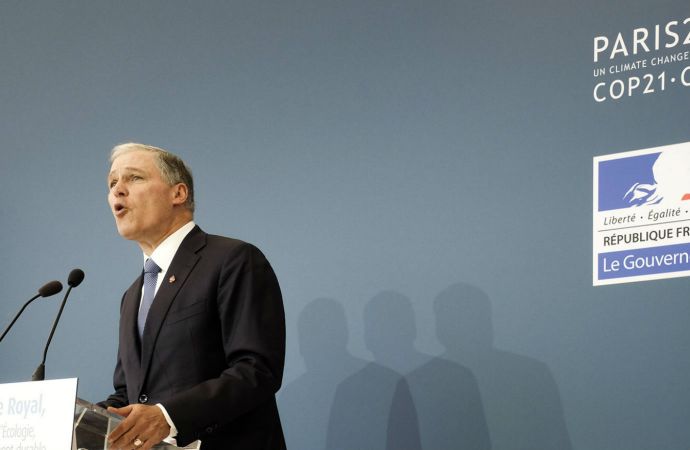Governor Inslee earmarks $959,000 to phase out HFCs as part of climate-action plan.

Washington Governor Jay Inslee at the Paris climate talks in 2015
Jay Inslee, governor of Washington state, this week unveiled a $273 million climate action plan – including $959,000 to phase out HFCs – that would reduce greenhouse gas emissions to 25% below 1990 levels by 2035.
The proposal, which would need to be enacted by the Washington legislature, includes a transition to 100% clean energy and ultra-efficient buildings, as well as the elimination of HFC “superpollutants.”
Phasing out HFCs alone would enable Washington to cut 2 million metric tons of CO2e greenhouse gas emissions by 2035, “a significant step toward meeting the state’s reduction targets,” said Inslee in a policy brief. In total the plan targets an emissions reduction of 16 million metric tons.
“[The] international community and business leaders have recognized HFC pollution as a serious threat and the transition to climate-safe alternatives as an economic opportunity,” he said in the policy brief.
Inslee co-founded the U.S. Climate Alliance, a bipartisan coalition of governors from 16 states and Puerto Rico committed to reducing short-lived climate pollutants (SLCPs), including HFCs. (Last month, the newly elected governors of Michigan, Illinois and Wisconsin pledged to join the alliance.)
If Inslee’s HFC-reduction program is enacted, Washington would join U.S. Climate Alliance members California, New York, Maryland and Connecticut as states that have launched HFC-reduction programs.
Washington was also one of 15 U.S. states and the District of Columbia that send a letter last month to the U.S. Environmental Protection Agency (EPA) “strongly opposing” its proposed revisions to updated leak repair and maintenanceregulations that were extended to HFCs.
In June 2018, Washington joined nine other states and Washington, D.C., in a lawsuit to protect the EPA’s SNAP (Significant New Alternatives Policy) rule regulating HFC emissions.
[The] international community and business leaders have recognized HFC pollution as a serious threat and the transition to climate-safe alternatives as an economic opportunity."
Jay Inslee, Governor of Washington
Related stories


_1635407946.jpg)
